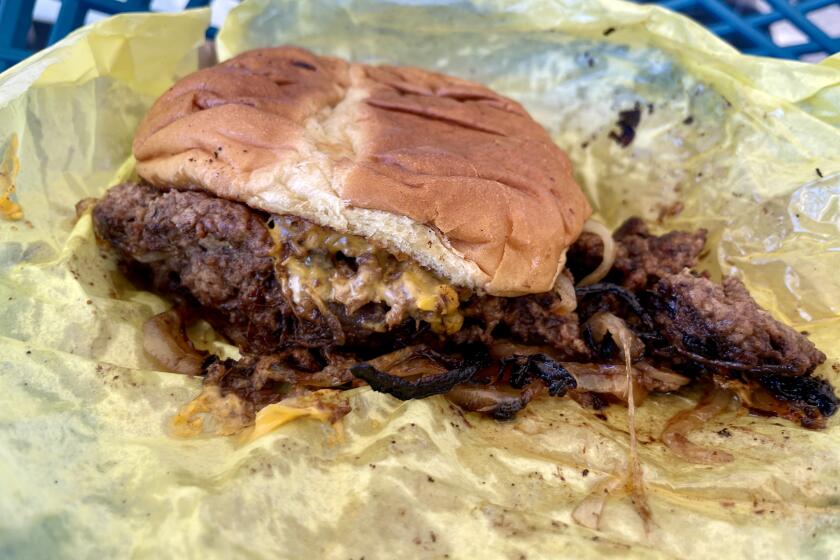The ‘science’ behind Lynda Resnick’s Pom Wonderful juice
Let no one state that Lynda Resnick shouldn’t be proud of the marketing skills she mustered to turn her pomegranate juice into a household name.
In her 2009 memoir, she describes in detail her campaign to “create a market” for a product that only a small fraction of Americans were even aware of. The Beverly Hills business owner, art collector and philanthropist even pays homage to the red baseball-shaped fruit in the title of her book, “Rubies in the Orchard.”
Here’s the money quote: “People needed pomegranate juice in their lives (even if they didn’t know it yet), and I knew they would pay what it was worth.”
The result is Pom Wonderful — the juice packaged in distinctively curvaceous bottles — which sells at your local supermarket for as much as five to six times per ounce as garden-variety cranberry juice. Privately held Pom doesn’t release financial figures, but marketing surveys put the firm’s sales in the neighborhood of $100 million.
Given the personal commitment of Resnick to this product, it’s not surprising that the people at her company are outraged that the Federal Trade Commission and Food and Drug Administration have accused them of hyping the health benefits of Pom juice as though they’re just a gang of cheap hucksters.
Pom contends that the agencies are adulterating its right of free speech. The company says the regulators should focus on firms that make unhealthy products or drugs, not those that market pure produce bursting with healthfulness, like Pom.
“Pomegranate juice is a food; it’s not a drug,” Pom’s president, Matthew Tupper, told me last week. He said Pom’s “fundamental belief” is that the FTC’s action violates “our constitutional right to share information” with consumers.
The agencies say the fault lies with Pom. The FTC, in an administrative complaint filed Sept. 27 against Lynda Resnick, her husband, Stewart, and their company, took aim at what it says are their “false and misleading” and “unsubstantiated” representations about Pom’s health benefits.
The FDA, in a warning letter last February, informed the company that the extravagant health claims it made for Pom juice qualified the product as a drug, and its marketing campaign therefore was unlawful. (Pom responded that it was within its rights to convey “truthful, non-misleading and substantiated” scientific results.)
It’s certainly true that Pom wants you to think its product is some sort of magic elixir. The juice is pitched as an “antioxidant superpower” and “health in a bottle.” Pom has put up billboards with the words “Cheat Death” next to a picture of the bottle. Its ads have claimed Pom has beneficial effects on prostate cancer (“Drink to prostate health”), cardiovascular health and even erectile dysfunction. It says these claims are backed by more than $30 million in medical research.
The problem identified by the government regulators is that Pom makes its boasts in the name of marketing, but dresses them up as scientifically valid. Long experience should tell the average consumer that marketing and science seldom make for a good marriage.
Science is about trying to establish truth. Marketing is about convincing consumers that smoking the right cigarettes will get you girls even if you look like a camel, or that — as Resnick showed by marketing Fiji Water — they’re being “green” by drinking water shipped from a dictatorship 5,000 miles across the sea.
So let’s take a stroll through Pom’s World of Science.
Prostate cancer? The FTC complaint quotes an interview Pom posted on its website in which Resnick says pomegranate juice is the “one thing that will keep your PSA [a common biological marker for prostate cancer] normal…. There is nothing else we know of that will keep your PSA in check.” She mentioned a UCLA study of 46 men that showed the juice “arrested their PSA.”
Here’s the truth about that UCLA study, which fed pomegranate juice to subjects who had been previously treated for prostate cancer and which was funded by the Resnicks. It doesn’t support any of Lynda Resnick’s claims. The study doesn’t show that pomegranate juice made the subjects’ PSA “normal” or “arrested” it. The study found that the juice may slow the elevation of PSA levels, but acknowledged that the phenomenon might not tell doctors anything of clinical value.
Moreover, the study was done without a control group treated with a placebo, meaning that the scientists had no grounds for attributing any of their findings to the pomegranate juice.
Tupper told me that Lynda Resnick’s statements shouldn’t be taken as an “advertisement” and that since they were made in an interview, they’re none of the FTC’s business.
“She’s talking about what she personally believes with respect to the science that she’s seen…. Lynda’s not a doctor,” he said. “She’s not offering scientific opinion; she’s speaking, as I said, as an individual from the heart about what she believes.”
Whether Pom can make that argument stick with the FTC is anybody’s guess, but if it succeeds it would score a historic marketing breakthrough — just let your CEO make extravagant claims about your product, and if you’re challenged explain (nicely, of course) that he or she is a scientific ignoramus speaking “from the heart.” I can see the boss of Toyota, among others, making very profitable use of this technique.
On to erectile dysfunction. Pom’s website claims that a Pom-financed study of 55 men who drank Pom or a placebo showed that after consuming Pom daily for four weeks, “the men reported 50% greater likelihood of experiencing improved erections as compared to placebo.”
I assume that the 50% figure in this convoluted assertion was chosen because it sounds like a statistically significant result. Here’s what the study says: “Overall statistical significance was not achieved.”
Cardio? The lead author of a large medical study cited on the Pom website, involving 289 subjects and financed by Roll International, the parent company of Pom (and Fiji Water), told me his study “did not show a cardiovascular benefit” from pomegranate juice for the whole study population, though there were “intriguing” signs of a benefit for a high-risk subgroup.
Most of the nearly two dozen “featured” studies on the Pom website involve very small subject groups tested over periods as brief as a few months, and many are properly classified as preliminary or pilot studies. From what I can tell, all but one were conducted by scientists known to have received funding from the Resnicks or their companies.
The studies tended to show that drinking pomegranate juice doesn’t hurt (unless one counts the damage to consumers’ pocketbooks). There may even be a positive health effect here and there. But Pom’s advertising claims go way beyond the science. The firm is not exactly selling snake oil, but it’s hard to avoid the impression that it has learned a few things from that ancient trade’s sales techniques.
One can sympathize with the challenge Lynda Resnick faced in marketing a beverage that tastes like shoe leather dissolved in Robitussin. (At least to my palate.) There are two paths she could have taken — load the drink with sugar to make it more broadly palatable, or load her ads with scientific mumbo-jumbo.
She chose the second. More power to her, but more power to the FTC and FDA in their efforts to keep her ads as pure as her juice.
Michael Hiltzik’s column appears Sundays and Wednesdays. Reach him at mhiltzik@latimes.com, read past columns at latimes.com/hiltzik, check out facebook.com/hiltzik, and follow @latimeshiltzik on Twitter.
More to Read
Eat your way across L.A.
Get our weekly Tasting Notes newsletter for reviews, news and more.
You may occasionally receive promotional content from the Los Angeles Times.







